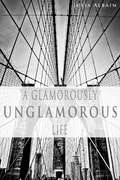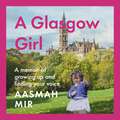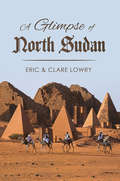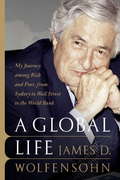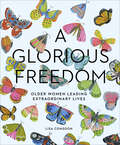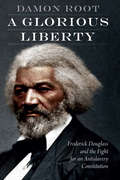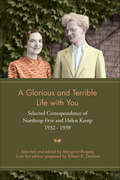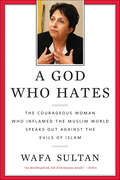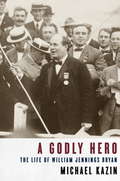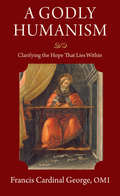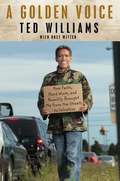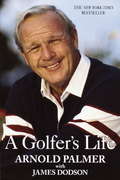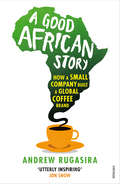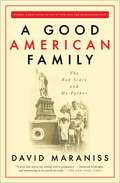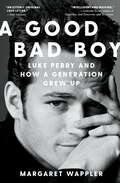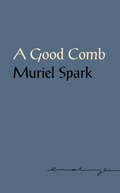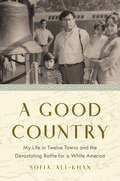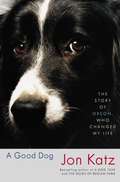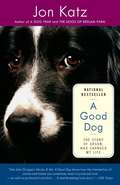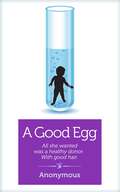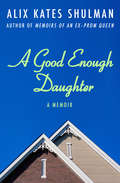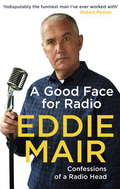- Table View
- List View
A Glamorously Unglamorous Life
by Julia AlbainWhen I was 22 I hopped a plane for New York City, off to pursue my destiny, sure that I'd never look back. This is my story of looking back. Of a journey that took on a whole new meaning and purpose. A year in New York City. A year of discovering the best and worst parts of myself. A year of learning the lessons that you can only learn the hard way.
A Glasgow Girl: A memoir of growing up and finding your voice
by Aasmah MirA fascinating and emotive narrative capturing the journey many second-generation Britons have travelled from the familial bonds of their parents' countries to establishing a life and identity for themselves in the United Kingdom.A Pebble In The Throat is two stories told in unison. Aasmah Mir growing up in Glasgow - the place of her birth - and the upbringing of her mother in Pakistan a generation before. It is an emotional and thought-provoking narrative on what it is like to live in two very different cultures whilst all the time aware of racism, prejudice and stereotyping of gender from the 1960s onwards. A Pebble In The Throat captures life from the lens of a little girl, teenage loner, and grown-up student leaving the safety of home - a witness, sitting on the edge of two cultures, describing what it means to be striving for acceptance in one whilst attempting to fulfil expectations in the other. It will capture the essence of life as a Pakistani in Glasgow and bring vividly to life the one character who shaped her childhood - her mother - who gave her the confidence to seize life and find her voice.(P) 2023 Headline Publishing Group Ltd
A Glimpse of Eden
by Evelyn AmesA safari in East Africa brings a couple to see Africa with new eyes and gives them a greater appreciation of its wildlife and man's natural heritage.
A Glimpse of North Sudan
by Eric Clare LowryNorth Sudan is a largely unknown, thought-to-be-unsafe land. A Glimpse of North Sudan aims to correct that. This book is far more than a travelogue. From diaries and photographs of a safe, non-alcoholic, wonderful holiday, it tells of a short tour of a smiling poor people with an ancient, frequently violent history, pyramids and tombs in royal cemeteries with wonderful paintings and reliefs to behold. It is a largely desert country but where the Blue and White Niles combine to form a majestic life-giving river on its way to the Mediterranean Sea. In addition, there are descriptions of black Sudanese pharaohs of Egypt, the lifestyle of a Bedouin family along with British involvement in ruling the country (a section on the Battle of Omdurman led by Kitchener with a young, ambitious Winston Churchill in the ranks) and of the civil wars since independence in 1956. Finally, it suggests a way out of the cul-de-sac of poverty and deprivation. This book is a must-read for the general-interest reader of a forgotten, though fascinating, land.
A Global Life: My Journey Among Rich and Poor, from Sydney to Wall Street to the World Bank
by James D. WolfensohnThe autobiography of the larger-than-life, visionary financier and humanitarian who led the World Bank through one of its most intense and tumultuous decades in the struggle against global poverty
A Glorious Freedom: Older Women Leading Extraordinary Lives
by Lisa Congdon&“The remarkable women celebrated in [this] vibrantly illustrated collection . . . offer stirring words of encouragement to any woman, of any age&” (Booklist). The glory of growing older is the freedom to be more truly ourselves. With age we gain the confidence to pursue bold new endeavors and worry less about what other people think. In this richly illustrated volume, bestselling author and artist Lisa Congdon explores the power of women over the age of forty who are thriving and living life on their own terms. A Glorious Freedom includes profiles, interviews, and essays from women such as Vera Wang, Laura Ingalls Wilder, Julia Child, Cheryl Strayed, and many others who have found creative fulfillment and accomplished great things in the second half of their lives. Each section is lavishly illustrated and hand-lettered in Congdon's signature style.
A Glorious Liberty: Frederick Douglass and the Fight for an Antislavery Constitution
by Damon RootIn this timely and provocative book, Damon Root reveals how Frederick Douglass&’s fight for an antislavery Constitution helped to shape the course of American history in the nineteenth century and beyond. At a time when the principles of the Constitution and Declaration of Independence were under assault, Frederick Douglass picked up their banner, championing inalienable rights for all, regardless of race. When Americans were killing each other on the battlefield, Douglass fought for a cause greater than the mere preservation of the Union. &“No war but an Abolition war,&” he maintained. &“No peace but an Abolition peace.&” In the aftermath of the Civil War, when state and local governments were violating the rights of the recently emancipated, Douglass preached the importance of &“the ballot-box, the jury-box, and the cartridge-box&” in the struggle against Jim Crow. Frederick Douglass, the former slave who had secretly taught himself how to read, would teach the American people a thing or two about the true meaning of the Constitution. This is the story of a fundamental debate that goes to the very heart of America&’s founding ideals—a debate that is still very much with us today.
A Glorious and Terrible Life With You
by Margaret BurgessNorthrop Frye's status as one of the most influential critics and intellectuals of the twentieth century makes it difficult to gauge the personal qualities of the man behind the work. However, an intimate picture is revealed through the correspondence Frye exchanged with his first wife, Helen Kemp, and which he bequeathed to Victoria College at the time of his death. In A Glorious and Terrible Life with You, Margaret Burgess presents the essential narrative at the heart of the correspondence, focusing on the thoughts, feelings, and formative experiences of the two central protagonists as they chronicle both their own intertwined voyages of growth and discovery and the central events of their time. Bringing to life their interactions with families and friends, their educational milieu, and the significant cultural and historical currents of the 1930s, these letters show both Frye and Kemp engaging with and contributing to the unique cultural climate of the period. Rich and compelling, they exemplify the wonderful eloquence and vitality of spirit that is evident throughout all of the correspondence. A Glorious and Terrible Life with You is a touching and highly revealing account of the relationship between two kindred spirits and remarkable minds. Lavishly illustrated, this new edition includes family photographs and original graphics by both Helen Kemp and her father, S.H.F. Kemp, mostly dating from his own student days at the University of Toronto.
A God Who Hates: The Courageous Woman Who Inflamed the Muslim World Speaks Out Against the Evils of Islam
by Wafa SultanFrom the front page of The New York Times to YouTube, Dr. Wafa Sultan has become a force radical Islam has to reckon with. For the first time, she tells her story and what she learned, first-hand, about radical Islam in A God Who Hates, a passionate memoir by an outspoken Arabic woman that is also a cautionary tale for the West. She grew up in Syria in a culture ruled by a god who hates women. "How can such a culture be anything but barbarous?", Sultan asks. "It can't", she concludes "because any culture that hates its women can't love anything else." She believes that the god who hates is waging a battle between modernity and barbarism, not a battle between religions. She also knows that it's a battle radical Islam will lose. Condemned by some and praised by others for speaking out, Sultan wants everyone to understand the danger posed by A God Who Hates.
A Godly Hero: The Life of William Jennings Bryan
by Michael KazinIn American populist Bryan (1860-1925), Kazin (history, Georgetown U. ) finds a hero and leader of the Christian left. Though remembered today mostly as the voice of fundamentalism in the 1925 Scopes trial about teaching evolution, he says Bryan was the most popular speaker of his time, and gained a huge following among both rural and urban Americans to whom he combined the righteousness of a pastor with the practical vision of a reform politician. Annotation ©2006 Book News, Inc. , Portland, OR (booknews. com)
A Godly Humanism: Clarifying the Hope That Lies Within
by Francis E. George OMIIs the Catholic Church a movement built around ideas, or a communion built around relationships? In A Godly Humanism, Francis Cardinal George shares his understanding of the Church in lively, compelling prose, presenting a way to understand and appreciate the relationships of God to human beings and of human beings to one another. These loving relationships are continually made available to us in and through the Church, from the time of Jesus&’s first disciples down to our own day. We are introduced to how the spiritual and intellectual life of Christians, aided in every generation by the Holy Spirit working through the Apostles and their successors, resist the danger of splitting apart from one another. Though they take different outward forms at different times, both wisdom and holiness are made possible for every Christian in any station of life. Sign-posting his conversation by the milestones of his own spiritual and intellectual journey, Cardinal George invites us to view the Church and her history in ways that go beyond the categories of politics—through which we find merely human initiative, contrivance, and adjustment—and rather to see the initiative as God&’s first and foremost. God is the non-stop giver, we are non-stop recipients of his gifts, and the recent popes, no less than the Father of the Church, have made every effort to make us aware of the graces—that is, of the unearned benefits—that God confers on us as Catholics, as Christians, as believers, and simply as human beings. Pope Francis, he reminds us, contrasts human planning with God&’s providence, and this book is at once an exposition of that providence and a personal response of gratitude for the way it has operated in one man&’s life.
A Golden String
by Daisy NewmanFor everyone who has been touched by novelist Daisy Newman’s serenity and humor--winsome memoirs of her fulfilled and joyful life. "My eighties? Impossible! I have to admit that the immediate effect was not one of sobering maturity but of recklessness. I no longer needed to save for my old age. It had arrived. I could splurge. And I could say anything I pleased. If it happened to be outrageous, it would be excused on the grounds of senility. I felt lighthearted, liberated.”--from the Foreword This charming narrative unfolds on the author’s eightieth birthday as she reflects on what to do next. An inspiring story of her rewarding and courageous life, it details her struggles, joys, and creative impulses--beginning in England and a childhood spent traveling through Europe, her education at Radcliffe, marriage, motherhood, remarriage--and the successful novels and children’s books that were written all the while. Running through Newman’s life we see a kind of golden string tying together people, places, and incidents. For the first time, the real people behind the fictional characters in Newman’s beloved novels are revealed along with the motivating forces behind each one. "Of the many who illuminated my spirit along the way, a few people unconsciously struck the spark that enkindled particular books," she writes. "Their likenesses never appear, yet some element of their personalities touches the pages." Newman began A Golden String as a gift to her family. She decided to publish it only at the urging of friends. Now this insightful and moving journey is available for everyone to savor and enjoy.
A Golden Voice
by Ted WilliamsYouTube sensation Ted William's memoir of addiction, homelessness, and unlikely redemption, cowritten by #1 New York Times bestselling author Bret WitterTed Williams was panhandling in December 2010 when a passerby taped him and posted a clip of his gorgeous radio voice on YouTube. The video went viral, and overnight, launched him--the homeless man with a golden voice--into the hearts of millions.Since then, millions have heard pieces of his story: his successful radio career, his crack addiction, his multiple arrests, and his heartbreaking relationship with his ninety-year-old mother. But in A Golden Voice, Ted Williams finally puts all the pieces together to give an unforgettable, searingly honest account of life on the streets. Nothing is held back, as Williams takes the reader through prostitution, theft, crack houses, and homeless shelters in a search, ultimately, for redemption and hope. Along the way, we see his relationship with his long-term girlfriend, Kathy, grow into an unlikely and inspiring love story, and we hear the Golden Voice of God lead Ted from the selfishness of crime to the humility of the street corner--almost a year before he was "discovered" on that highway entrance ramp.But this memoir isn't just an exploration of wrongs and a once-in-a-lifetime chance to give homelessness a voice. It is a deeply American, from-the-heart comeback story about the power of hope, faith, and personal responsibility. With the innate charisma that has won him millions of fans, Ted Williams proves that no one, no matter how degraded, is too lost for a second chance.
A Golfer's Life
by Arnold PalmerThere has never been a golfer to rival Arnold Palmer. He's the most aggressive, most exciting player the game has ever known, a dynamo famous for coming from behind to make bold last-minute charges to victory. To the legions of golf fans known around the world as "Arnie's Army," Palmer is a charismatic hero, the winner of sixty-one tournaments on the PGA Tour and still going strong on the Senior PGA Tour. But behind the legend, there is the private Palmer--a man of wit, compassion, loyalty, and true grit in the face of personal adversity. Golf-crazy as far back as he can remember, Arnie followed his dad, "Deacon" Palmer, the head greenskeeper, around the Latrobe Country Club fairways; as a youth he played at dawn before the club members arrived (the only time he was allowed on the course); by the time he graduated from high school he was headed for the national circuit. His rise to fame was meteoric, and by the 1960s he had emerged as one of the few American athletes the public truly cared about--a vibrant, daring, handsome sports celebrity who attracted wild crowds and enormous television audiences whenever he played and whose charisma propelled the explosion of enthusiam for golf in the sixties.Writing with the humor and candor that are as much his trademark as his unique golf swing, Palmer narrates the deeply moving story of his life both on and off the links. He recounts his friendships (and rivalries) with greats of the game, including Jack Nicklaus, his enduringly happy marriage with Winnie, his legendary charges to triumph and his titanic disasters, and his valiant battle against cancer. Returning to the Senior PGA Tour with unmatched zeal after his recovery, Palmer reminded fans of his unfaltering heroism--and the world of golf is thankful.From small-town boy to golfing legend, Arnold Palmer has lived one of the great sporting lives of the twentieth century. Now, with the help of acclaimed golf writer James Dodson, he has created one of the great sports autobiographies of our time.From the Hardcover edition.
A Good African Story: How a Small Company Built a Global Coffee Brand
by Andrew RugasiraSince it was founded in 2003, Good African Coffee has helped thousands of farmers earn a decent living, send their children to school and escape a spiral of debt and dependence. Africa has received over $1 trillion in aid over the last fifty years and yet despite these huge inflows, the continent remains mired in poverty, disease and systemic corruption. In A Good African Story, as Andrew Rugasira recounts the very personal story of his company and the challenges that he has faced – and overcome – as an African entrepreneur, he provides a tantalising glimpse of what Africa could be, and argues that trade has achieved what years of aid have failed to deliver.This is a book about Africa taking its destiny in its own hands, and dictating the terms of its future.
A Good American Family: The Red Scare and My Father
by David MaranissIn a riveting book with powerful resonance today, Pulitzer Prize-winning author David Maraniss captures the pervasive fear and paranoia that gripped America during the Red Scare of the 1950s through the chilling yet affirming story of his family’s ordeal, from blacklisting to vindication.Elliott Maraniss, David’s father, a WWII veteran who had commanded an all-black company in the Pacific, was spied on by the FBI, named as a communist by an informant, called before the House Un-American Activities Committee in 1952, fired from his newspaper job, and blacklisted for five years. Yet he never lost faith in America and emerged on the other side with his family and optimism intact. In a sweeping drama that moves from the Depression and Spanish Civil War to the HUAC hearings and end of the McCarthy era, Maraniss weaves his father’s story through the lives of his inquisitors and defenders as they struggle with the vital twentieth-century issues of race, fascism, communism, and first amendment freedoms. A Good American Family powerfully evokes the political dysfunctions of the 1950s while underscoring what it really means to be an American. It is an unsparing yet moving tribute from a brilliant writer to his father and the family he protected in dangerous times.
A Good Bad Boy: Luke Perry and How a Generation Grew Up
by Margaret WapplerAn artful and contemplative tribute to the late actor famed for his role as Dylan McKay in Beverly Hills, 90210.Best known for playing loner rebel Dylan McKay in Beverly Hills 90210, Luke Perry was fifty-two years old when he died of a stroke in 2019. There have been other deaths of 90&’s stars, but this one hit different. Gen X was reminded of their own inescapable mortality, and robbed of an exciting career resurgence for one of their most cherished icons—with recent roles in the hit series Riverdale and Quentin Tarantino&’s Once Upon a Time In Hollywood bringing him renewed attention and acclaim. Only upon his death, as stories poured out online about his authenticity and kindness, did it become clear how little was known about the exceedingly humble actor and how deeply he impacted popular culture. In A Good Bad Boy, Margaret Wappler attempts to understand who Perry was and why he was unique among his Hollywood peers. To do so, she uses an inventive hybrid narrative. She speaks with dozens who knew Perry personally and professionally. They share insightful anecdotes: how he kept connected to his Ohio upbringing; nearly blew his 90210 audition; tried to shed his heartthrob image by joining the HBO prison drama Oz; and in the last year of his life, sought to set up two of his newly divorced friends. (After his death, the pair bonded in their grief and eventually married.) Amid these original interviews and exhaustive archival research, Wappler weaves poignant vignettes of memoir in which she serves as an avatar to show how Perry shaped a generation&’s views on masculinity, privilege and the ideal of &“cool.&” Timed to the fifth anniversary of Perry&’s death, A Good Bad Boy is a profound and entertaining examination of what it means to be an artist and an adult.
A Good Comb: The Sayings of Muriel Spark
by Muriel SparkCelebrate the immortal Muriel Spark’s hundredth birthday by imbibing a delicious glass of her bubbly wit A Good Comb, a small gift edition of Muriel Spark’s brilliant asides, sayings, and aphorisms, is a book for sheer enjoyment. No writer offers such lively, pointed, puckish insights: “Neurotics are awfully quick to notice other people’s mentalities.” “It is impossible to persuade a man who does not disagree, but smiles.” “The sacrifice of pleasure is of course itself a pleasure.” “It is impossible to repent of love. The sin of love does not exist.” “She wasn’t a person to whom things happen.” “You look for one thing and you find another.” “It calms you down, a good comb.” Her scope is great and her striking insights are precise and unforgettable. This book will entertain you—it will even help you live your life. Drink in the pleasures of this little volume along with the benefits of taking up such advice as “Never make excuses but if you must, never make more than one—it gives the appearance of insincerity.” And “Beware of men bearing flowers.”
A Good Country: My Life in Twelve Towns and the Devastating Battle for a White America
by Sofia Ali-KhanA leading advocate for social justice excavates the history of forced migration in the twelve American towns she&’s called home, revealing how White supremacy has fundamentally shaped the nation. &“At a time when many would rather ban or bury the truth, Ali-Khan bravely faces it in this bracing and necessary book.&”—Ayad Akhtar, Pulitzer Prize–winning author of Homeland Elegies Sofia Ali-Khan&’s parents emigrated from Pakistan to America, believing it would be a good country. With a nerdy interest in American folk history and a devotion to the rule of law, Ali-Khan would pursue a career in social justice, serving some of America&’s most vulnerable communities. By the time she had children of her own—having lived, worked, and worshipped in twelve different towns across the nation—Ali-Khan felt deeply American, maybe even a little extra American for having seen so much of the country. But in the wake of 9/11, and on the cusp of the 2016 election, Ali-Khan&’s dream of a good life felt under constant threat. As the vitriolic attacks on Islam and Muslims intensified, she wondered if the American dream had ever applied to families like her own, and if she had gravely misunderstood her home. In A Good Country, Ali-Khan revisits the color lines in each of her twelve towns, unearthing the half-buried histories of forced migration that still shape every state, town, and reservation in America today. From the surprising origins of America&’s Chinatowns, the expulsion of Maroon and Seminole people during the conquest of Florida, to Virginia&’s stake in breeding humans for sale, Ali-Khan reveals how America&’s settler colonial origins have defined the law and landscape to maintain a White America. She braids this historical exploration with her own story, providing an intimate perspective on the modern racialization of American Muslims and why she chose to leave the United States. Equal parts memoir, history, and current events, A Good Country presents a vital portrait of our nation, its people, and the pathway to a better future.
A Good Dog
by Jon KatzBONUS: This edition contains an excerpt from Jon Katz's Going Home."People who love dogs often talk about a 'lifetime' dog. I'd heard the phrase a dozen times before I came to recognize its significance. Lifetime dogs are dogs we love in especially powerful, sometimes inexplicable ways."-Jon Katz In this gripping and deeply touching book, bestselling author Jon Katz tells the story of his lifetime dog, Orson: a beautiful border collie-intense, smart, crazy, and unforgettable. From the moment Katz and Orson meet, when the dog springs from his traveling crate at Newark airport and panics the baggage claim area, their relationship is deep, stormy, and loving. At two years old, Katz's new companion is a great herder of school buses, a scholar of refrigerators, but a dud at herding sheep. Everything Katz attempts- obedience training, herding instruction, a new name, acupuncture, herb and alternative therapies-helps a little but not enough, and not for long. "Like all border collies and many dogs," Katz writes, "he needed work. I didn't realize for some time I was the work Orson would find." While Katz is trying to help his dog, Orson is helping him, shepherding him toward a new life on a two-hundred-year-old hillside farm in upstate New York. There, aided by good neighbors and a tolerant wife, hip-deep in sheep, chickens, donkeys, and more dogs, the man and his canine companion explore meadows, woods, and even stars, wade through snow, bask by a roaring wood stove, and struggle to keep faith with each other. There, with deep love, each embraces his unfolding destiny. A Good Dog is a book to savor. Just as Orson was the author' s lifetime dog, his story is a lifetime treasure-poignant, timeless, and powerful.
A Good Dog: The Story of Orson, Who Changed My Life
by Jon Katz"People who love dogs often talk about a 'lifetime' dog. I'd heard the phrase a dozen times before I came to recognize its significance. Lifetime dogs are dogs we love in especially powerful, sometimes inexplicable ways."--Jon Katz. In this gripping and deeply touching book, bestselling author Jon Katz tells the story of his lifetime dog, Orson: a beautiful border collie--intense, smart, crazy, and unforgettable. From the moment Katz and Orson meet, when the dog springs from his traveling crate at Newark airport and panics the baggage claim area, their relationship is deep, stormy, and loving. At two years old, Katz's new companion is a great herder of school buses, a scholar of refrigerators, but a dud at herding sheep. Everything Katz attempts--obedience training, herding instruction, a new name, acupuncture, herb and alternative therapies--helps a little but not enough, and not for long. "Like all border collies and many dogs," Katz writes, "he needed work. I didn't realize for some time I was the work Orson would find." While Katz is trying to help his dog, Orson is helping him, shepherding him toward a new life on a two-hundred-year-old hillside farm in upstate New York. There, aided by good neighbors and a tolerant wife, hip-deep in sheep, chickens, donkeys, and more dogs, the man and his canine companion explore meadows, woods, and even stars, wade through snow, bask by a roaring wood stove, and struggle to keep faith with each other. There, with deep love, each embraces his unfolding destiny. A Good Dog is a book to savor. Just as Orson was the author's lifetime dog, his story is a lifetime treasure--poignant, timeless, and powerful.
A Good Egg: All She Wanted Was a Healthy Donor. With Good Hair.
by Anonymous AnonymousShe&’ll do anything to become a mother—including stalking prospective egg donors&’ profiles on Facebook. In this hilarious yet poignant memoir of one woman&’s quest to conceive, the brave new world of artificial baby-making takes an unexpected turn when social media comes into play. As the not-quite-young-enough author obsessively examines the online antics of her nubile egg donor wannabes, she questions what it means to be a mother and, in the process, discovers the meaning of love.
A Good Enough Daughter: A Memoir (Senior Lifestyles Ser.)
by Alix Kates ShulmanAn honest, unflinching reflection on the meaning of family, from the author of the bestselling novel Memoirs of an Ex-Prom QueenAlix Kates Shulman wasn&’t looking forward to helping her aging parents clean out their house and prepare for the final years of their lives. She had fled suburban Cleveland at age twenty to carve out her own life in New York City. But as she began dismantling their house of forty years, the task evolved into a precious learning experience she would never forget. Shulman discovers the lives of two colorful, vibrant people from whom she remained distant while pursuing a literary career. She finds herself grappling with regret and seeking redemption in the search for what it means to be a good daughter. With warmth and insight, Shulman sheds light on a complex, painful event that many adults eventually face—the final trip home.
A Good Face for Radio: Confessions of a Radio Head
by Eddie MairEddie Mair is, by his own account, one of Britain's most beloved broadcasters.Born in Dundee, Scotland, he has worked in radio all his adult life. From the foothills of commercial radio in his hometown, through the sunlit uplands of the BBC in Scotland, he has reached the peaks of his profession, with BBC network radio in London. And he's never afraid to work a metaphor beyond endurance.In addition he's appeared on most of the BBC's TV channels, including ones that are no longer on TV. He witnessed the handover of Hong Kong and once asked Arnold Schwarzenegger a question - though he takes no responsibility for either.For nearly twenty years he has been at the helm of Radio 4's PM: a nightly news round up that means Eddie works for just one hour a day, giving him plenty time to knock together these diaries.Whether he's interviewing politicians, getting people to share their personal experiences, or just imparting his favourite zesty chicken recipes, Eddie is never happier than when he is at the microphone. Except when he is at the microphone with a large martini.In truth, his neediness is an irritation to everyone who knows him and if you buy this book he might get out of their hair.Eddie's other work, as a humanitarian and tireless, secret worker for charity is not mentioned in these pages.
A Good Face for Radio: Confessions of a Radio Head
by Eddie MairEddie Mair is, by his own account, one of Britain's most beloved broadcasters.Born in Dundee, Scotland, he has worked in radio all his adult life. From the foothills of commercial radio in his hometown, through the sunlit uplands of the BBC in Scotland, he has reached the peaks of his profession, with BBC network radio in London. And he's never afraid to work a metaphor beyond endurance.In addition he's appeared on most of the BBC's TV channels, including ones that are no longer on TV. He witnessed the handover of Hong Kong and once asked Arnold Schwarzenegger a question - though he takes no responsibility for either.For nearly twenty years he has been at the helm of Radio 4's PM: a nightly news round up that means Eddie works for just one hour a day, giving him plenty time to knock together these diaries.Whether he's interviewing politicians, getting people to share their personal experiences, or just imparting his favourite zesty chicken recipes, Eddie is never happier than when he is at the microphone. Except when he is at the microphone with a large martini.In truth, his neediness is an irritation to everyone who knows him and if you buy this book he might get out of their hair.Eddie's other work, as a humanitarian and tireless, secret worker for charity is not mentioned in these pages.
